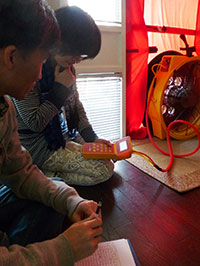Here are some frequently asked questions for the PEAK program. If you can think of any others, please contact bishops@douglascollege.ca.
What distinguishes our building energy
and resource management programs?

- Flexible learning opportunities including online and face-to-face instruction with experienced industry professionals
- Inclusion in a community of people passionate about building-based energy and resource stewardship
- Introduction to a large network of energy specialists, sustainability leaders industry experts and employers
- Guest speakers, site visits, tours and special events supplement the face-to-face classes and provide real-world examples of the principles explored in the classroom
- Opportunities to collaborate with others to optimize learning
- Learning goals developed with industry and stakeholder goals to ensure competencies developed are what are needed in the workplace
- Course work designed to build a professional portfolio
- Professional accreditation on successful completion of the program and practical work experience component
Is this program for you?
Here are some reasons people have been attracted to and benefited from this program. Past students have been represented by:
- Professionals wishing to augment their knowledge and add new competencies. These include architectural, engineering, facilities management and operation, trades, design, business, government, education, technology, media, marketing and sales and entrepreneurial backgrounds
- Individuals wishing to change their career or make a contribution to an improved future for the built environment
- Post-secondary students interested in exploring careers in sustainability, green building, energy and environmental careers
What pre-qualifications are needed?
We are open to any motivation you have for joining the program. We are happy to discuss with you how to gain the most benefit from your previous education and experience, and how to contribute to the learning environment with the same.
Here are a few characteristics that are an asset in successful completion of the program. For professionals, an openness to new ideas, commitment to life-long learning are very helpful if you want to be successful in this program. If you are new to building-based, energy and resource topics:
- Math skills: we make use of basic algebra and basic business math
- Physics: we build on the basic understanding of physical properties of matter and energy.
- Current events: we are up-to-date on current events related to energy and resource issues, green building topics, sustainability issues and public policies. If you are new to these topics – begin now!
- Once you start looking, you will find that the topics in this program are well represented in current events. In fact, you don’t have to look too far – we all live, work and spend most of our time in the built environment.
For everyone:
- A commitment to improving our use of the built-environment, improving our understanding of energy and resource use, and improving our capacity to collaborate with each other towards worthwhile goals.
Where do graduates work or find career opportunities?
Depending on your background and interests, there are a number of opportunities open to PEAK graduates. Organizations that recognize the credential (usually in combination with other qualifications) include:
- Architectural and Engineering firms involved in Sustainable Design and Commissioning
- Construction firms specializing in Green Building
- Operations and Maintenance Contractors
- Energy Service Contractors
- BC Hydro – has helped develop our program to support their Energy Management programs
- Fortis BC - currently recommending graduates to their customers for Energy Specialist positions.
- Facilities Management departments
- Municipal Offices
- Developers working on sustainable development projects
- Energy and Environmental Consultants
- Large Organizations with Sustainability Offices
- Business Development Associations
- Public Sector Institutions – schools, colleges, universities, health authorities